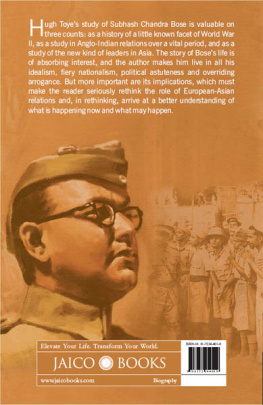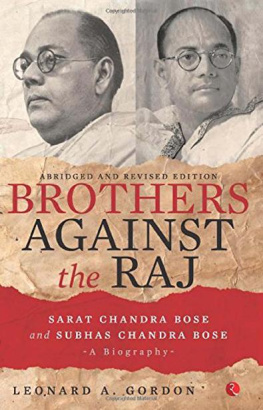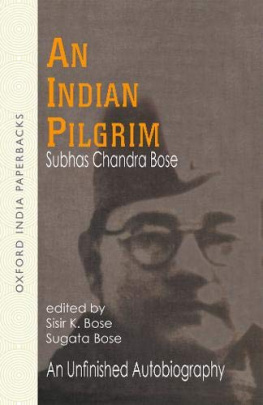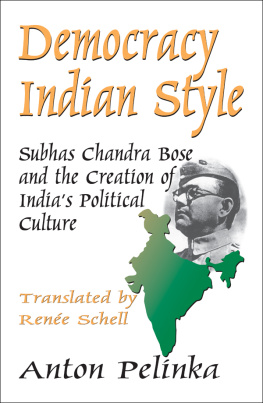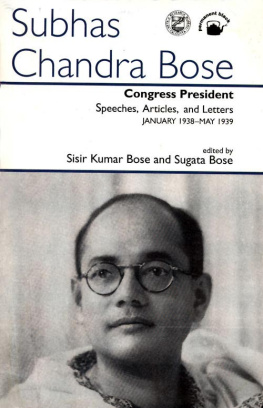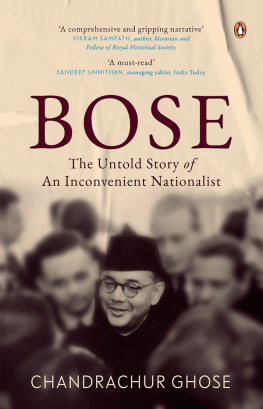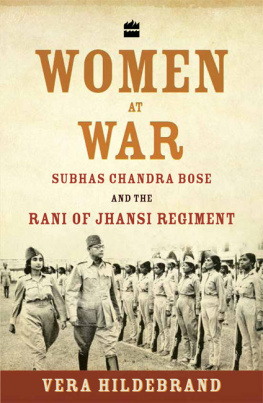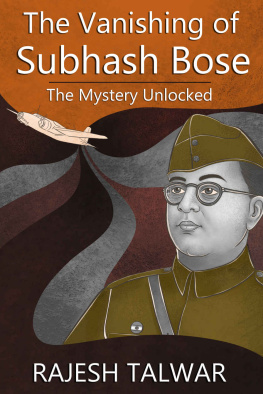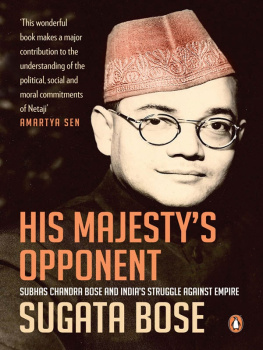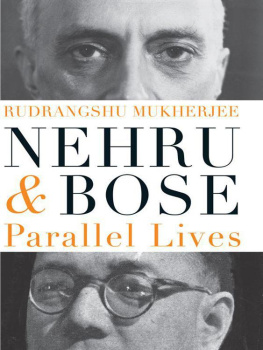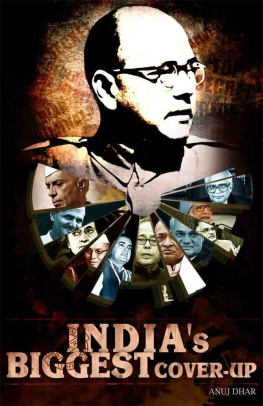Published by Jaico Publishing House
A-2 Jash Chambers, 7-A Sir Phirozshah Mehta Road
Fort, Mumbai 400 001
jaicopub@jaicobooks.com
www.jaicobooks.com
Hugh Toye
SUBHASH CHANDRA BOSE:
THE SPRINGING TIGER
ISBN 81-7224-401-0
First Jaico Impression: 1991
Sixteenth Jaico Impression (Enlarged Edition): 2010
Nineteenth Jaico Impression: 2011
No part of this book may be reproduced or utilized in any form or by any means, electronic or mechanical including photocopying, recording or by any information storage and retrieval system, without permission in writing from the publishers.
To My Father and Mother
FOREWORD
On February 15th, 1942, at Singapore, some eighty-five thousand men, the remainder of the British forces in Malaya, surrendered to the Japanese. About twenty thousand more had already been killed or had previously been captured. The final surrender was the culmination of a disaster as complete and dramatic as any that has befallen British arms anywhere in the world; in the East, there had been nothing like it since the annihilation of a British army in the gorges of the Kabul River just a hundred years before. Of the troops who fell into Japanese hands, more than half, nearly sixty thousand altogether, were Indians; in the course of their captivity, rather less than half of them, about twenty-five thousand, threw off their allegiance and joined what was called the Indian National Army; this was the army of Free India, a provisional government that claimed to be a national state under the Presidency of Subhash Chandra Bose the subject of this book and to be allied with the Japanese. In military law, they thus committed the offences of mutiny, desertion and waging war against the King.
Yet more than half the Indians, some thirty-five thousand, stood firm to their allegiance, facing continuous privation and hardship, sometimes torture and death, rather than be false to the salt they had eaten and the oaths they had taken when they enlisted; meanwhile, their comrades, men of sister battalions of the same regiments, drawn from the same stock, with the same traditions, won glory for their colours and the admiration of their fellow soldiers British, American, Germans alike in North Africa, Italy and Burma. Why did these other troops go over to the enemy? Was their act, as most British soldiers thought, a simple betrayal of faith? Or was it, as many Indians came passionately to believe, an outburst of nationalist fervour?
That is one question of interest to anyone concerned with the motives for human behaviour. A second is how these men were treated at the end of the war. The decisions taken have been criticised with bitterness and from varied quarters; it is the kind of criticism which is easy after the event, but in the circumstances of the time, I do not believe any other general line of policy could have been taken. And though I recall several long statements setting out the grave and very real dangers involved in every possible course of action, I know of no constructive alternative ever put forward and rejected.
In the whole story, the personality of Subhash Chandra Bose plays an important part, with which Mr. Toye has dealt in his book; here, as an introduction to his book, are the barest outlines, sketched from another angle. Among the twenty-five thousand technically guilty of mutiny there were, in proportions about which one can hardly be precise, men whose motives fall into four classes. Some and I would judge few joined the I.N.A. with the intentions of rejoining the British forces when they saw a chance; some and I would judge the majority were puzzled, misinformed, misled, and on the whole believed the course they took was the most honourable open to them. Others were frankly opportunist, some really were fervent nationalists: in both these classes, I would suppose there were nothing like so many as in the second. And of course these categories were not clear-cut; there were men whose motives were thoroughly mixed and some mixture in almost all.
The Indian Army consisted of volunteers even in the war when it grew to two million and a half and men came to the colours partly because the pay, food and clothing were by Indian standards very good, partly because in India the soldiers profession has always been held in honour. There had been for a century and a half Indian officers, promoted from the rank, who might command a platoon, or in emergency a company, and who held a subordinate form of commission signed by the Viceroy, the higher officers who held a Kings Commission were until 1919 British. Of the officers with the Kings Commission, regular or emergency, I should suppose that, by the time of Singapore, approaching one-fifth were Indians.
The men were taken away from their higher officers when they were captured. They often had no source of news that was not Japanese and they were told that Britain was defeated and the war was over. I knew the men and lower-grade-officers of one of these battalions well: in particular, I remember their Subadar-Major, whose position was something between those of Adjutant and Regimental Sergeant-Major, a straightforward little man from the remoter hills. They were Himalayan peasants, very credulous and curiously humble in their attitude to the world beyond their hills, magnificent soldiers when firmly led, but when deprived of firm leadership too conscious of their own lack of knowledge and experience to offer much resistance to propaganda. To this battalion was sent an Indian officer who had held a Kings Commission and had for a short time served with them before the surrender. He told them that the war was over and that they had the choice between digging latrines for the Japanese and once more becoming soldiers but this time in the service of an Independent India. They chose to be soldiers.
The behaviour of this battalion was, I believe, typical of many. It did contain an element of nationalism: the men had long been aware of Indias progress towards independence and felt for it a natural sympathy of an undefined, uncritical nature which was normally not strong enough to compete with the hold of the Army; of this hold the strands were discipline, regimental pride, loyalty to individual officers, good food and fair treatment. But now they were actively misled and to men of this category I believe the great majority of the twenty-five thousand it came as a surprise to find themselves fighting against their former comrades. Such men were quick to desert or surrender from the I.N.A., the Indian National Army.
Among the Kings Commissioned Officers, educated men, the conflict between two sets of values was much more continually present. They were used to hearing their Indian friends describe as patriotism what their British fellow-officers called disloyalty. Yet they had held the Kings Commission and enjoyed its benefits, knowing that some Indians and no doubt occasionally their own hearts charged them with treachery. One must respect such a man as Subhash Chandra Bose, who resigned from the Indian Civil Service because he sincerely believed it his duty to India; that respect can hardly be extended to all who changed sides in adversity and who a second time chose the more comfortable path. But it would be wrong to imply that opportunism was the sole motive. The story of Mohan Singh, told in this book, provides one example of an officer who made his choice from a genuine conviction and was prepared to suffer for his beliefs. And the personality of Bose must have been an overriding factor with many.
The Japanese overreached themselves and were defeated in the long stubborn battle for Imphal, General Slims victorious army poured southward through Burma, and the I.N.A. disillusioned, defeated, starving and in rags crawled in to surrender, by twos and threes, by platoons, by battalions. By international and military law, they could have been tried by court-martial for mutiny and desertion and shot on the spot. But clearly the problem was a big one with political implications; it was not faced at the time there was too much to do and they were sent back to India as though they had been prisoners of war. The Indian public at this stage did not know of their existence. But when the war with Japan suddenly ended, the problem could be postponed no longer; the police had to be told about the I.N.A. and the Government had to decide what was to be done with them.

